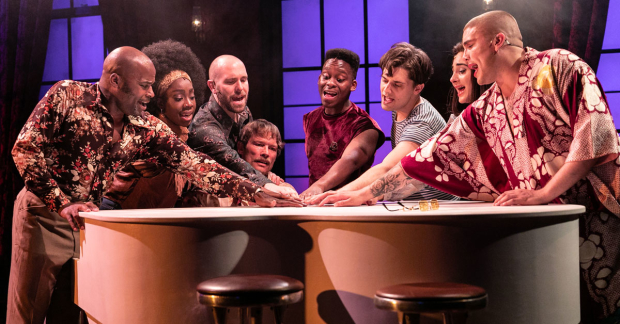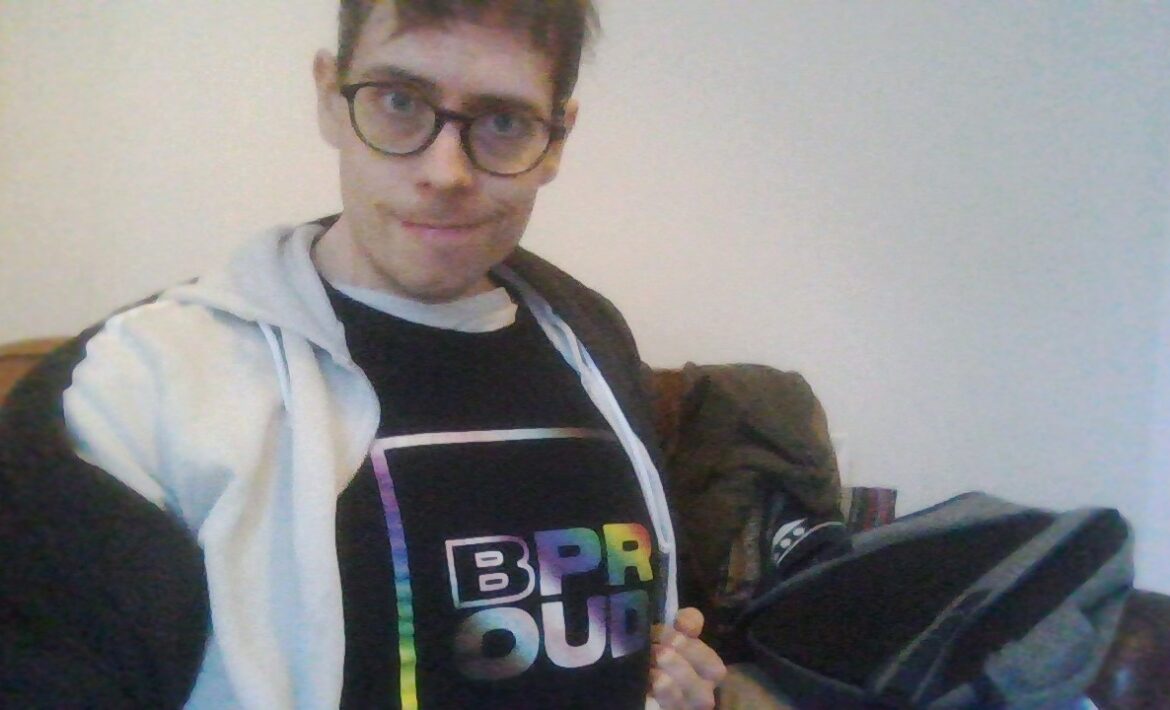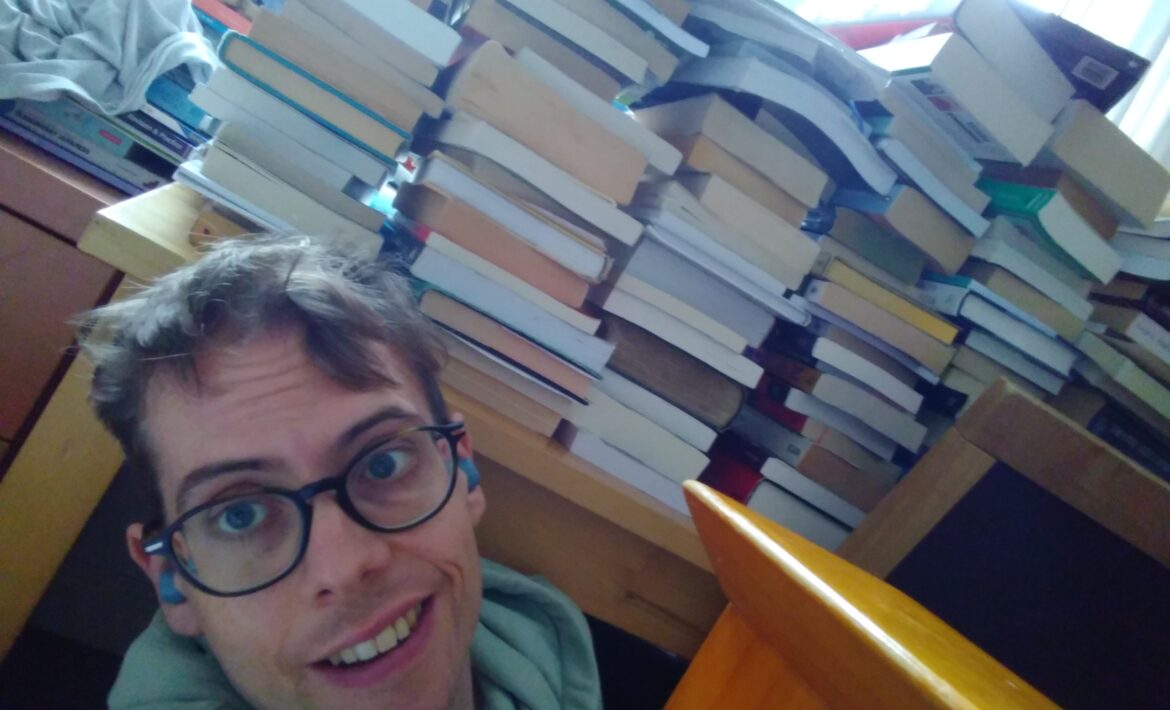
Sunday 30th August 2020 – Autistic Coding on Stage : Dear Evan Hansen, The View UpStairs and me – #2
Hello everyone!
Here is part two of my analysis of autistic coding in musical theatre. If you haven’t read last week’s blog about being on stage, please do. Find it here:
https://jorikmol.com/sunday-23rd-august-2020-autistic-coding-on-stage-dear-evan-hansen-the-view-upstairs-and-me-1/ As before, trigger warnings for violence and emotional abuse and spoilers for absolutely everything.
Autistic coding is different in the theatre than in the written word. The physical and vocal markers of autistic people are employed to express status, emotional intensity within a scene and as a joke, to show off the character’s oddness for an easy laugh, a vague sense of superiority or to be frightened of. Musical theatre, due to its complexity in its staging, has always worked with less complex characters than non-musical drama. This can lead to far greater emotional resonance. It can also lead to the unnecessary restatement of tired tropes. Below I’ve included an event at this year’s Autistica Research Festival. Have a look to learn more about autistic coding (but not before reading the rest of this blog).
Part 2:
THE VIEW UPSTAIRS
When I was in drama school, I saw a lot of Dutch ‘cabaret’ – comedic musical theatre, mostly containing a single writer-performer who addresses the audience directly. The art form is a particularity to the Netherlands and many common tropes were plainly visible.¹ The views on autism and neurodiversity fit into a wider narrative of “Doe even normaal” (can’t you just act normal?), where people who seek to define themselves as autistic are mocked for being attention-seekers² on the one hand and pitiable on the other. Additionally, on the whole, people with learning disabilities are widely referred to as kinderen (children), men as jongen (boy) and women as meisje (girl), whatever their age.³ The common trope of a disabled person as a kind of primitive genius is present in discussions of the autism spectrum as well as learning disabled people. Whenever this trope came back, I felt laughed at and belittled. When people asked why I looked upset, I said that I felt humiliated. The inevitable response: Doe eens normaal. All I could do was to reinforce my mask. The point was made: if I wanted to belong, I needed to hide and mask.
In my second year there, I saw a production called Verplichte Figuren (mandatory figures), a new musical that attempted to combine musical theatre with social commentary, with performances from Alex Klaassen and Jelka van Houten. The one part that still sticks out is the narrative of Erik-Jan, who is “geestelijk gehandicapt” – mentally disabled. What disability he has was not quite clear, but it seemed to be a combination of autism, down’s syndrome and learning disabilities. He falls in love with his carer and ends up raping her, repeating the word “geil” – horny as the lights go down. There were belly laughs, mostly. But some saw it as a shocking piece of social commentary, but against what I wasn’t quite sure; I mostly felt it was against me and the idea I could ever feel sexual attraction with anyone. I wasn’t wrong. The trope of autistic and disabled people’s sexuality being frightening is as common as it ever was (I have blogged about this in previous weeks).
I ended up auditioning for conservatories to study musical theatre. I never got beyond the first round. I was too nervous and visibly depressed. I also felt, wrongly, that if singing, without writing the song you sing, was equal to a moose burling in the woods. An object, making a noise. I didn’t want to be an object for other people to impose their will onto, I wanted to create. I was wrong about this regarding musical theatre, but coming out the previous two years, my cynicism was understandable.
In 2019, I saw The View UpStairs, a musical starring Andy Mientus, whom I first saw online as Hanschen in the 2015 Deaf West Broadway production of Spring Awakening. The plot is based on a true story about the arson attack on a gay bar in New Orleans in 1973. Before the 2016 Pulse mass murder, this was the most lethal attack on a queer venue in US history.³ The story focuses on Wes, a millennial brat who buys the building in the 2010s is led back through a time warp to the real Up Stairs just before the attack happened. Wes’ attitudes on who he is and who he can be in the 2010s are brilliantly echoed in the conversations he has that put his experience in the context of a wider historical struggle. The show is brilliant on how queer history and the history of racism are interlinked. The casting too, with a Black lead and a predominantly POC and practically completely queer cast. It is very entertaining and a powerfully political piece that deserves further exposure.⁴
However, my problem lies in the figures of the white characters Patrick, played by Andy Mientus; and Dale, played by Declan Bennett. As an autistic queer, Dale was actually the person I found, despite his characterisation, performance and writing, the person that I would probably be in that context. The performer slurred his words, which, on top of the often inconsistent New Orleans accent, made me really struggle to hear him. His body language and vocal inflections are “too much” and he is autistically coded. Also, the character’s central motivation is ‘to be seen’, by his peers (we’ll come back to this). Like Patrick, he is a homeless sex worker. But unlike Patrick, he gets no sympathy from the people who are supposed to be his friends. In fact, they roundly mock him for being depressed. He is seen as ugly, cheap and if the other men have sex with him, that harms their reputation in the tightly-knit community around the gay bar.
Patrick’s characterisation makes this worse. He is most likely in his late twenties/early thirties, sees himself as “a failure” and fantasises about great achievements while getting ticketed for climbing into a tree in the centre of town. Mientus, though, plays him like a child. I seem to remember that he said he has been homeless for fifteen years, since he turned fourteen. That makes him 29, two years older than Wes. The damage of having to make his living selling his body for a place to sleep and food should affect him and, on a surface level, it does. He behaves like a fourteen-year-old, his naivety making him look stupid. The show positions him as a foil for Wes and, interestingly, as the butt of jokes about Wes’ sophistication and the surroundings he finds himself in. Patrick is an oddball, though not particularly autistically coded. He is affected by his sense of failure but has a group of people he can fall back on. What saves him is the fact that he’s cute. If he’s asked to act normal, that is done in a joking, gentle manner that shows the kindness the others feel for him.
Dale is not so lucky. His self-pity is irritating, both to me and the characters on stage with him. Like Patrick, his life as a homeless street hustler affected him badly and he is emotionally stunted – but gets punished where Patrick gets away with it. Where he asks for help, he meets with frustration and negativity. Where he messes up, he’s ridiculed. When he’s not on stage, the characters mock him behind his back. Dale is a strongly autistically-coded character, depressed about him lot in life, but not getting the support from his community that he needed. Many of us have been Dale, even in queer spaces. I’ve been Dale. I still sometimes am⁶.
But this cutting discrepancy between two characters is not really addressed. What could be an interesting rivalry between Patrick and Dale for Wes is lost. Instead Wes finding out that Patrick is a ‘hustler’ lowers Patrick – in his estimation – to the level of Dale. Dale is a black sheep, he tarnishes others by association, simply by existing in a space that should have been safe for him.
Of course, Wes’ hypocrisy is pointed and affecting. In the past, I told a guy on Grindr that I wasn’t interested because I found out he was “professional”. But I felt humiliated rather than disgusted with this man, as Wes does. It made me feel old, unattractive, worthless. I was upset that he was trying to have sex with me because I feared he thought of me as easy pray. I was ugly, autistic and mentally ill. Easy meat to be taken advantage of. I was wrong and I was wrong in a cruel way. But regardless of my reasons, I rejected him because of his job. That is hurtful to that guy. And I regret that.
Of course, in any show with such a large cast, there need to be characters with less focus. Yet Patrick is the second romantic lead. And Dale is the antagonist. Patrick and Dale are each other’s mirror images, probably the same age. Essentially, if Dale hadn’t been neurodiverse, he would have been a love rival to Patrick. Showing both as mentally fourteen years old does all three characters a disservice. Wes is by no means more mature than either – in fact, at 27, he is younger than both. The conflict between the double of Patrick and Dale is rarely mentioned,
For the first four-fifths of the story, we are supposed to be irritated by Dale’s presence. It works. We are irritated by him until it is too late. Perhaps it is a clever theatrical ploy to make the audience complicit in the bullying of Dale, but makes the claims the show purports to have (having a queer family for its own sake) utterly hypocritical. The gruesome deaths of the patrons become a justifiable punishment for the crawling cruelty and dismissal with which Dale has been treated; not just by those outside the bar, but inside it.
This leads to a wider point. What is the purpose of a queer family? Why do we need community? Wes very clearly sets up the modern cis gay male experience as one that is empty, obsessive, eloquently messed-up. He lets that go in the face of a community which opens its arms for him. But what is that community? What is the purpose of it? What is so bad about being alone? Simply referring to loneliness as a bad thing doesn’t work. Dale should be part of that community but he isn’t seen by any of the characters. The purpose of community is only available for those the community deems worthy. What’s the point to celebrate community as a safeguard from the cruelty of society if it simply copies it? What does Wes gain from having a community, then? Some shallow friends with witty repartee and camp? A sense of superiority? Good sex with an aging twink who sings he is “still in my prime”?
This is a far more cynical perspective than the show wants us to take, but, by heavily underlining the necessity of community spaces and still treating Dale this way, it makes it very difficult for neurodivergent audiences to like the other characters, and for neurotypical audiences to see Dale as anything else but a villain – a disease to be eliminated from “safe” queer spaces.⁶
A potential solution could be that Patrick is both older than Dale but may also have taken advantage of Dale. This would have made Patrick less of a Manic Pixie Dream Boy⁷ and showed the cutthroat nature of surviving on nothing as a queer homeless young person in the mid-20th century South. Buddy (one of the men who frequents the bar) is a character whose development wouldn’t have suffered from having had sex with both Patrick and Dale. Even a previous relationship/one-night stand with Dale would have made both more interesting.
Perhaps Patrick was taught the ways of the street by Dale and was surpassed by his student. Perhaps Patrick taught Dale but he was capable of staying on just the right side of sane. Perhaps Dale made the mistake of being with bad men and worse drugs. Or maybe it’s just that Patrick was NT and Dale was not. The punishment for both is death, Patrick is unidentified white male #2 and Dale – it is implied – commits suicide after his act. The point is still: Patrick Good, Dale Bad.
Both Dale and Patrick’s characters are far more interesting than the show gives them credit for. The focus on Wes and his struggles with drugs and loneliness is understandable but, as the representation of the audience, he is always going to be less interesting than anyone on stage – perhaps apart from Buddy, who is a boor and Henri, who is also underused. Yet having less focus on Wes’ mental state and a greater focus on the gay men around him might increase the drama between Dale – the murderer – and the rest of the cast. Now Dale just goes under the radar for much of the show. The image above actually shows a song where the characters celebrate togetherness – without Dale in the room.
The dichotomy between Dale and Patrick problematises the narrative and sours the main point of the show: that as queer people, we need inclusive communities. The fact that the most neurodiverse character on stage is bullied and then villainised is an ugly reaffirmation of the positions many neurodivergent queer people find themselves in. Even in a story that celebrates inclusive communities, autistic people are on the outside, looking in.
____________________________________________________________
Thank you for reading part 2 of this three part analysis. I wrote the bulk of it almost exactly a year ago, after watching The View UpStairs. I hope you enjoy it and if you are part of any groups who work on making theatre more inclusive, please share these blogs with them. I’d love to talk about how to make neurodivergent theatre accessible to performers, creatives and audiences. Turning down the sound in West End shows is not the answer.
FOOTNOTES
¹ For more on mainstream Dutch cultural modes and how it communicates a very particular sense of self-image, I greatly recommend White Innocence by Prof. Gloria Wekker https://www.dukeupress.edu/white-innocence It’s the best book on the Netherlands I have ever read.
² An example from Brigitte Kaandorp is here: https://www.youtube.com/watch?v=Qjp_aRjktAQ (Unfortunately, Dutch only)
³ This comes through very strongly in a song about the fictional Johannes – including a reference to him having sex with trees and a really weird characterisation towards the end – from Youp van ‘t Hek: https://www.youtube.com/watch?v=_5FvB_P1K40 (Dutch only, once again).
⁴ For more information, please follow these links:
https://sohotheatre.com/shows/the-view-upstairs/
https://en.wikipedia.org/wiki/UpStairs_Lounge_arson_attack
https://www.nbcnews.com/feature/nbc-out/view-upstairs-fictional-take-real-tragedy-n750821
⁵ I would like to apologise to Dr Jason Price at Sussex university. When he told me that he was researching radical political movements in musical theatre, I said: “but isn’t musical theatre inherently rightwing?” I was a prat at 22.
⁶ In recent years, I have built my own autistic community. If you are interested in reading more about the ethics of doing so, our successes and where I fucked up – please let me know.
⁷ For more on this trope, see: https://en.wikipedia.org/wiki/Manic_Pixie_Dream_Girl#Manic_Pixie_Dream_Boy


